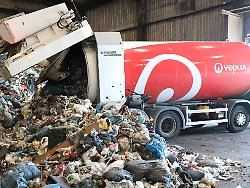Monday April 12, 2021
Attack on the German market too
The French are shaping global garbage giants
Veolia and Suez are already individually number one and number two in global waste management. Now the rivals settle their quarrel and form a new giant. Together they also want to expand on the German waste disposal market.
The two, according to their own statements, the world’s largest waste and water management companies are merging to form a new industry giant. The French rivals Veolia and Suez have agreed after a long tug of war on a billion dollar merger, as the companies announced. As a result, Veolia improved its offer for Suez and is now offering EUR 20.50 per share after initially EUR 18. This corresponds to a total value of Suez of around 13 billion euros.
Veolia had declared in the past that it wanted to create a “super world champion” in waste and water management with a takeover, thereby putting its competitors from China in their place. Both Veolia and Suez operate almost all over the world. Veolia, with around 1150 employees, is a partner of around 200 municipalities in the Federal Republic of Germany, supplies around one million people with drinking water and operates more than 120 sewage treatment plants.
As in other countries, Veolia and Suez also act as competitors in Germany for waste disposal. As a result of the merger, the French, currently number three and four, will rise to become the second largest player in the industry behind the market leader, the German waste management company Remondis. Its top position could also falter, however: Veolia boss Antoine Frérot had already announced last summer that, after the intended merger with Suez, he wanted to drive expansion, especially in the German market.
Shareholders enthusiastic
Veolia started the battle to take over Suez in the summer. After months of negotiations and disputes in court with the Suez management over an amicable takeover, Veolia recently addressed the shareholders directly with its offer. Suez had resolutely rejected a hostile takeover back in February. It is Veolia’s second attempt to take over Suez. In 2012, this failed, among other things, due to antitrust concerns. The new agreement now provides for parts of Suez’s activities to be spun off into a new unit with sales of around seven billion euros in order to secure the approval of the antitrust authorities.
Veolia now hopes, according to its own statements, to be able to form “a global champion of ecological change” with its competitor with a turnover of 37 billion euros. On the stock exchange, the shares of both companies shot up. Suez gained up to 8.5 percent, Veolia climbed up to 6.8 percent.
.
